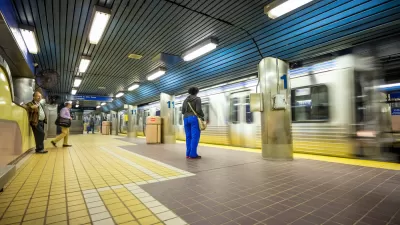A report announced by Mayor Michael Nutter estimates that Philadelphia's park system has a combined economic value of $1.9 billion in services, income and taxes to the city.
A report by a national expert on urban parks quantifies the economic value of Philadelphia's park system in terms of pollution control, property values, health, tourism and community cohesion. It also puts a price on all the services the parks provide that residents would otherwise pay for. The study, by the Center for City Park Excellence of the Trust for Public Land, was the kind of exercise Mayor Michael Nutter embraces. Nutter is looking for more public-private partnerships to invest in both parks and recreation. The $1.9 billion value "gets you into more of a business kind of conversation," Nutter said. "This document backs up what many of us have talked about for a long period of time, but then puts it in black and white," Nutter added.
Peter Harnik, director of the Center for City Park Excellence, said the document also provides a baseline that can be revisited in future years to see if investment in the parks reaps dividends. Harnik divided the benefits into these four categories: Citizen cost savings (free recreation and services, increased health): $1.1 billion; Increased citizen wealth (property values, tourist business): $729.1 million; Tax revenue (from tourism and increased property values): $23.3 million. Government cost savings (stormwater management, air pollution control, time and money donated by volunteers): $16.1 million. "We think this is a huge, major enterprise," Harnik said. "We hope that these numbers and similar numbers that we generate for other cities around the country will help continue to revive, build and strengthen the city parks movement throughout the whole country."
FULL STORY: Report: Parks net big returns

Study: Maui’s Plan to Convert Vacation Rentals to Long-Term Housing Could Cause Nearly $1 Billion Economic Loss
The plan would reduce visitor accommodation by 25,% resulting in 1,900 jobs lost.

North Texas Transit Leaders Tout Benefits of TOD for Growing Region
At a summit focused on transit-oriented development, policymakers discussed how North Texas’ expanded light rail system can serve as a tool for economic growth.

Using Old Oil and Gas Wells for Green Energy Storage
Penn State researchers have found that repurposing abandoned oil and gas wells for geothermal-assisted compressed-air energy storage can boost efficiency, reduce environmental risks, and support clean energy and job transitions.

Santa Barbara Could Build Housing on County Land
County supervisors moved forward a proposal to build workforce housing on two county-owned parcels.

San Mateo Formally Opposes Freeway Project
The city council will send a letter to Caltrans urging the agency to reconsider a plan to expand the 101 through the city of San Mateo.

A Bronx Community Fights to Have its Voice Heard
After organizing and giving input for decades, the community around the Kingsbridge Armory might actually see it redeveloped — and they want to continue to have a say in how it goes.
Urban Design for Planners 1: Software Tools
This six-course series explores essential urban design concepts using open source software and equips planners with the tools they need to participate fully in the urban design process.
Planning for Universal Design
Learn the tools for implementing Universal Design in planning regulations.
Ascent Environmental
Borough of Carlisle
Institute for Housing and Urban Development Studies (IHS)
City of Grandview
Harvard GSD Executive Education
Toledo-Lucas County Plan Commissions
Salt Lake City
NYU Wagner Graduate School of Public Service



























